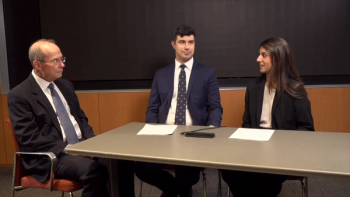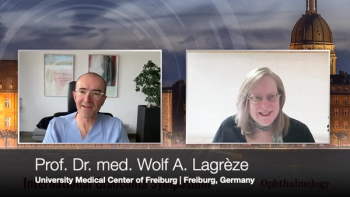
Supplements and Featured Publications
- Glaucoma 360: Highlights from 2020
Glaucoma treatment alternatives Thinking outside the box
Treatment options may expand beyond surgery, medication, and lasers
This article was reviewed by Shan C. Lin, MD
Most patients with
Although the only proven therapies are those that lower IOP and include medications, lasers, and surgeries, patients frequently inquire about using marijuana, ginkgo biloba, Memantine, acupuncture, meditation, blood pressure modification, and perhaps certain supplements as possible therapeutic candidates, Shan C. Lin, MD, commented.
Marijuana, which is legal for use in California, does lower IOP, but the duration of the effect is very short—about 3 hours—which would require that the patient use the drug almost continuously. Potential downsides, Lin noted, are concomitant lowering of the ocular perfusion pressure (by lowering the blood pressure) and addiction.
The American Academy of Ophthalmology does not recommend marijuana as a primary treatment for glaucoma. “There are better treatments to lower eye pressure, and it is not something that I recommend to my patients,” Lin said.
Ginkgo was described by Lin as a “relatively interesting agent” to treat glaucoma and other diseases. It is an herbal supplement obtained from the leaves of the ginkgo tree and has been used in Chinese medicine for 5000 years.
The compounds in the herb include flavonoids, lactones, and cyanidins—all antioxidants. “While it has not been completely established exactly how these molecules work, they may be helpful in the treatment of Alzheimer disease, stroke, and possibly glaucoma,” he said.
In addition to antioxidant activity, ginkgo also preserves the mitochondria, inhibits apoptosis, and possibly increases blood flow. A study supporting the use of ginkgo appeared in Ophthalmology;1 patients who had glaucoma with a significantly affected pretreatment mean deviation were instructed to take ginkgo for 4 weeks, and improved visual fields were observed with a substantial decrease in the amount of mean deviation. The results of a retrospective study of ginkgo for normal-tension glaucoma found a positive effect in that the herb may stop disease progression.2
Memantine seemed to be a promising option at 1 point and was studied in a large clinical trial for 5 years, but neither doses of the drug were superior to placebo in preventing progression.
Memantine works to prevent apoptosis by blocking the calcium channels in the retinal ganglion cells, Lin explained. “Calcium influx into the retinal ganglion cells starts the apoptotic cascade; Memantine starts early in the cascade to prevent cell damage and death,” he clarified.
Memantine is approved in the United States and Europe to treat dementia, but it can cause some neurologic adverse events.
Acupuncture has been used to treat glaucoma, but no effects were seen regarding IOP lowering, visual fields, or nerve scans in a recent University of California, Los Angeles study.3
In fact, slight increases in the IOP were seen after the acupuncture sessions. The blood pressure was lower in the non–eye-related treatment group. Lower blood pressure for patients with glaucoma may be harmful to their optic nerve perfusion.
Meditation in patients with glaucoma who were randomized to this activity was found to lower IOP by about 4 mm Hg compared with a control group in a study by Dada et al.4 Lin noted that although positive effects were seen in
Perfusion pressure, that is, the difference between blood pressure and IOP, is also a factor for consideration when treating glaucoma. Interestingly, Lin noted lower blood pressure is detrimental for patients with glaucoma. “This is the new paradigm,” he said and cited the results of the Barbados Eye Study5 in which lower blood pressure was associated with lower ocular perfusion pressure.
He also mentioned the Early Manifest Glaucoma Trial,6 which found that glaucoma progression was associated with lower ocular perfusion pressure.
Lin asks his patients about the status of their blood pressure and often coordinates his treatment with primary care doctors if there is pathologically low blood pressure.
Another powerful finding is that taking blood pressure medications at night (as many patients do) results in lower stroke and heart disease risk. However, taking blood pressure medications at night is less than beneficial for the perfusion pressure because blood pressure is typically lower at night already.
Other available supplements that patients can consider to possibly counteract progressive glaucoma are black currant, Mirtogenol tablets (a combination of blueberries and pine bark extract), palmitoylethanolamide, and omega-3 fatty acids. Small studies have shown that they may lower IOP, increase ocular blood flow, or be neuroprotective. Generally, the go-to treatments for glaucoma remain drops, laser, and surgeries.
“However, for patients whose glaucoma is progressing, these other agents, such as supplements and meditation, may have potential value,” Lin concluded.
Shan C. Lin, MD
e: [email protected]
Dr. Lin has no relevant financial interests to disclose. Dr Lin is codirector of research at the Glaucoma Center of San Francisco.
References
1. Quaranta L, Bettelli S, Uva MG, Semeraro F, Turano R, Gandolfo E. Effect of Ginkgo biloba extract on preexisting visual field damage in normal tension glaucoma. Ophthalmology. 2003;110:359-362.
2. Lee J, Sohn SW, Kee C. Effect of Ginkgo Biloba Extract on Visual Field Progression in Normal Tension Glaucoma. J Glaucoma. 2013 Dec;22:780-784.
3. Law SK, Lowe S, Law SM, et al. Prospective Evaluation of Acupuncture as Treatment for Glaucoma. Am J Ophthalmol. 2015 Aug;160:256-265.
4. Dada T, Mittal D, Mohanty K, et al. Mindfulness Meditation Reduces Intraocular Pressure, Lowers Stress Biomarkers and Modulates Gene Expression in Glaucoma: A Radomized Controlled Trial. J Glaucoma. 2018 Dec;27:1061-1067.
5. Leske MC. Ocular perfusion pressure and glaucoma: clinical trial and epidemiologic findings. Curr Opin Ophthalmol 2009 Mar;20:73-78.
6. Leske MC, Heijl A, Hyman L, et al. Predictors of Long-Term Progression in the Early Manifest Glaucoma Trial. Ophthalmology. 2007 Nov;114:1965-1972.
Articles in this issue
over 5 years ago
Assessing the angle: Getting back to basicsover 5 years ago
OCTA: The jury is still outover 5 years ago
Funding new technologies for glaucoma treatmentover 5 years ago
Glaucoma drug delivery devices enter new frontierover 5 years ago
Glaucoma devices: Now and in the futureover 5 years ago
Glaucoma 360: Lowering IOP using the MIMS solutionover 5 years ago
Beating burnout with camaraderieover 5 years ago
Status of glaucoma: diagnostics and treatments in fluxover 5 years ago
Next frontier in glaucoma: Beyond IOP-lowering treatmentsover 5 years ago
Normal tension glaucoma: testing diagnostic skillsNewsletter
Don’t miss out—get Ophthalmology Times updates on the latest clinical advancements and expert interviews, straight to your inbox.





























